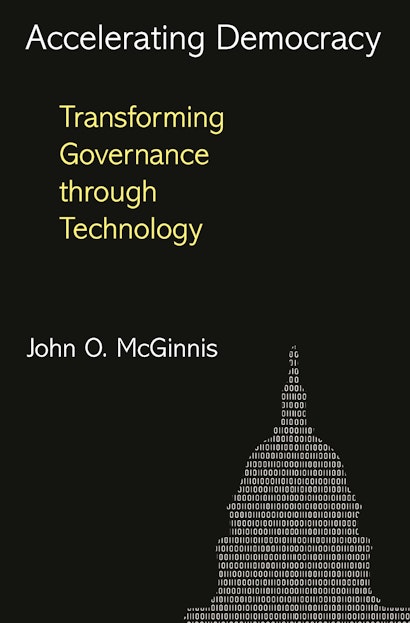Successful democracies throughout history—from ancient Athens to Britain on the cusp of the industrial age—have used the technology of their time to gather information for better governance. Our challenge is no different today, but it is more urgent because the accelerating pace of technological change creates potentially enormous dangers as well as benefits. Accelerating Democracy shows how to adapt democracy to new information technologies that can enhance political decision making and enable us to navigate the social rapids ahead.
John O. McGinnis demonstrates how these new technologies combine to address a problem as old as democracy itself—how to help citizens better evaluate the consequences of their political choices. As society became more complex in the nineteenth century, social planning became a top-down enterprise delegated to experts and bureaucrats. Today, technology increasingly permits information to bubble up from below and filter through more dispersed and competitive sources. McGinnis explains how to use fast-evolving information technologies to more effectively analyze past public policy, bring unprecedented intensity of scrutiny to current policy proposals, and more accurately predict the results of future policy. But he argues that we can do so only if government keeps pace with technological change. For instance, it must revive federalism to permit different jurisdictions to test different policies so that their results can be evaluated, and it must legalize information markets to permit people to bet on what the consequences of a policy will be even before that policy is implemented.
Accelerating Democracy reveals how we can achieve a democracy that is informed by expertise and social-scientific knowledge while shedding the arrogance and insularity of a technocracy.
John O. McGinnis is the George C. Dix Professor of Constitutional Law at Northwestern University.
"[McGinnis] shines an important light on a discussion that will only grow more lively as technology creates at once more opportunities and more challenges for government."—Foreign Affairs
"You can support or dismiss his proposals, but you cannot deny that the author makes a major effort to bring forth ingenious measures to really 'accelerate democracy'. Thus, this provocative book is worth reading for everybody interested in improving policymaking, or all those willing to explore new ways to help citizens through a more efficient use of technology."—Ana Polo Alonso, LSE Review of Books
"[T]he book is valuable for the stance it takes on the very pressing question of how democracies should adapt to the information revolution. The take-home message for young democracies, no doubt appealing also to many readers of this journal, is that the social sciences deserve as much support as the natural sciences. The more accurately the outcomes of government policies can be predicted, the better the information revolution can be harnessed, and the fewer public funds will be wasted on unrealistic policies. If McGinnis is right, then the heyday of the social sciences lies right before us."—Christian Gobel, Democratization
"The book is a valuable reference for any student of the gradually intertwining fields of democracy and technology since it is a well-written analysis arguing that democratic government is in need of evolution due to rapid technological changes. . . . Its engaging and enquiring style provokes thought on the future of a number of domains, including technology and political regimes."—Nelli Bahayan, Political Studies Review
"This is an outstanding book with a timely argument. McGinnis makes the important point that information is accelerating and democratic governance needs to evolve in response to rapid changes in information technology and other scientific fields. The breadth of his analysis and the keen insights he provides at many levels of the problem are impressive."—Darrell M. West, author of Digital Government: Technology and Public Sector Performance
"McGinnis discusses the challenges and opportunities for governance created by the rapid advance of technology, and analyzes these issues in a manner that is new and distinct. Accelerating Democracy tackles an important subject that has not been properly addressed in the literature to date."—Glenn H. Reynolds, University of Tennessee

